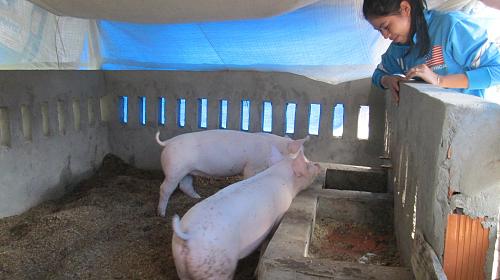
CARE works with governments to scale our models and approaches nationwide in a way that NGOs cannot do alone. One recent example is in Ethiopia, where we implement GRAD, a program that helps families on government assistance find sustainable paths out of poverty. GRAD’s biggest opportunity for sustainability and scale-up is by influencing and having its strategies adopted by the PSNP. Ato Aynalem Gezahegne is the PSNP’s Livelihood Coordination Unit (LICU) Coordinator for the Amhara Region. Ato Aynalem talked to “The Graduate” about GRAD-PSNP collaboration, the outcomes of the project, and how his office supports sustainability.
WHAT DO YOU THINK ARE THE MAJOR CHALLENGES THAT PSNP HOUSEHOLDS FACE IN TRYING TO ATTAIN FOOD SECURITY?
Lack of access to finance or loans, inputs, skills, and market linkages are some of the challenges for food insecure households. Of course, the biggest challenge has been the lack of finance. When GRAD started its operations in early 2012 it was very difficult to help households access loan from MFIs as most had outstanding loans from different initiatives prior to GRAD. So how do you rate GRAD’s approaches in resolving these challenges? We have learned a lot from GRAD. First of all, the project has put much effort to convince rural financial service providers including the Amhara Credit & Saving Institution (ACSI) to provide loans to project participants. GRAD provided a loan guarantee fund to the MFIs to share risks with them. Simultaneously, GRAD was giving business skills and other training to households and put in place strong follow-up. These efforts enabled the MFIs to provide loan to households, even some with outstanding loans. The project has also a very good experience in terms of accessing inputs for the households through engaging private sectors,
researchers, cooperatives and other relevant actors in multi-stakeholders platforms. These helped the households to access improved seed, as well as markets. The engagement of
the project participants in more than one value chain has been another factor. All these activities lift the confidence of the rural MFIs to provide loans to PSNP households.
WHAT MAJOR CHANGES AMONG GRAD PROJECT PARTICIPANTS MOST HELPED THEM GRADUATE FROM THE PSNP?
The project is not only about boosting productivity, it is also increasing incomes through accessing better markets. Most project participants have much better income now and repay
their loans on time. GRAD’s contribution to gender equality should also be appreciated. Ending division of labor between wives and husbands and ensuring mutual decision-making
were big challenges, especially in our region’s context. The work on gender equality has brought changes as the wives’ workload is being shared and resources are being wisely
spent. Gender equality has contributed a lot to improving livelihood status in the family and ensuring sustainable development in the community.
ANYTHING UNIQUE IN GRAD COMPARED WITH OTHER FOOD SECURITY PROJECTS IMPLEMENTED IN THE REGION?
The most impressive thing done by the project was the support given to the households to establish Village Economic and Loan Associations (VESA) which enable households to receive
training on various topics, save, and access small amounts of internal loan. This is one of the unique features of GRAD. GRAD’s value chains and market linkages are also functioning
well compared with other projects. Furthermore, the follow up and the continuous support given by the project staff to the households has been exemplary.
HOW DO YOU SEE CONTRIBUTIONS OF GRAD TO PSNP4 DESIGN? WHAT WERE THE MAJOR IDEAS TAKEN FROM THE PROJECT?
PSNP4 has taken many good lessons from GRAD. One of the lessons we have adopted is making groups formed by households with our support as one of the sources of finance for members’ livelihood improvement. We have taken some GRAD’s procedure in terms of rendering various training to households including financial literacy and business plan preparations, as well as on facilitating market linkages. We are preparing to duplicate VESA-like structures in all 64 PSNP woredas and give training to DAs on GRAD’s VESA manual.
HOW DO YOU SEE CONTRIBUTIONS OF GRAD TO PSNP4 DESIGN? WHAT WERE THE MAJOR IDEAS TAKEN FROM THE PROJECT?
PSNP4 has taken many good lessons from GRAD. One of the lessons we have adopted is making groups formed by households with our support as one of the sources of finance for members’ livelihood improvement. We have taken some GRAD’s procedure in terms of rendering various training to households including financial literacy and business plan preparations, as well as on facilitating market linkages. We are preparing to duplicate VESA-like structures in all 64 PSNP woredas and give training to DAs on GRAD’s VESA manual.
WHAT ARE YOUR PLANS TO CARRY FORWARD GRAD’S INITIATIVES AND OUTCOMES?
As I told you earlier, we are training DAs on GRAD’s VESA manual, so that we can replicate the best experiences in other areas. In the two GRAD woredas, the agricultural extension office will work to assure sustainability of VESAs. We will try our best to support MSPs initiated by GRAD so that households will have agricultural inputs and market opportunities in a sustainable manner. We are planning to make sure health extension workers work closely with DAs so that there would be experience sharing in nutrition. Similarly, we will enhance capacities of natural resource experts so that they can contribute to climate change adaptation. We have the structure to scale-up GRAD’s experiences, and take things forward.
About the project: GRAD is a five-year USAID-funded project designed to help the Government of Ethiopia find sustainable solutions to chronic food insecurity. The project supports households currently enrolled in the government's Productive Safety Net Program (PSNP) so that they may access microfinance, improve on and off-farm productivity, and improve links to markets. In addition, GRAD improves household and community resilience by: increasing women's empowerment; improving nutritional practices; and introducing local climate change adaptation mechanisms. CARE Ethiopia leads a consortium that includes REST, ORDA, CRS, Agri Service Ethiopia, and SNV. The project works in 16 districts in Amhara, Tigray, Oromia and SNNPR.
The follow on to GRAD—Livelihoods for Resilience—is a 5 year Feed the Future project working in 27 districts in Amhara, Tigray, Oromia and SNNPR. CARE Ethiopia leads a consortium that includes REST, ORDA, Agri Service Ethiopia, and SNV.


